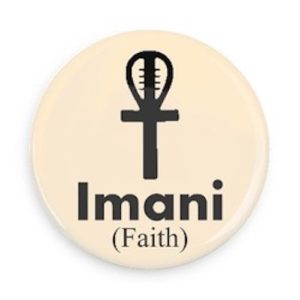
The ankh symbol
This date is the seventh and last day of Kwanzaa. Kwanzaa comes from the Swahili phrase "matunda ya kwanza," meaning "first fruits" or "first harvest." Kwanzaa is a Swahili word for this African American and Pan-African holiday. The use of Swahili, an East African language and the most widely spoken African language, denotes this holiday as Pan-African.
The seventh day focuses on Imani or faith. This principle honors the best of our traditions, draws upon the best in ourselves, and helps us strive for a higher level of life for humankind. Imani affirms our self-worth and confidence in our ability to succeed and triumph in righteous struggle. Imani is to believe in our people, parents, teachers, leaders, and the righteousness and victory of our struggle.
This principle of the Nguzo Saba (seven principles) is a profound belief in and devotion to all that is of value to Black people as a family, community, people, and culture. The ancient Egyptian double symbol of the ankh (picture) represents life and djed, symbolizing stability, endurance, and power.
Kwanzaa celebrates family, community, and culture. It is celebrated from December 26 through January 1.
“Kwanzaa brings a cultural message which speaks to the best of what it means to be African and human in the fullest sense,” according to the Kwanzaa website.
Kwanzaa: A celebration of family, community, and culture,
by Maulana Karenga,
University of Sankore Press, Los Angeles
Copyright 1998, by Malulana Karenga
ISBN 0-943412-21-8